江西省南昌三中2012-2013学年高二上学期第一次月考英语试题 Word版含答案
江西省南昌市第三中学2020学年高二英语上学期第一次月考试卷
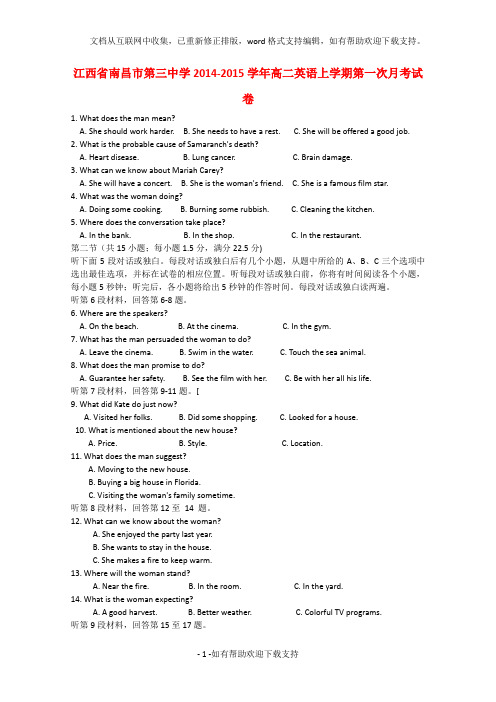
江西省南昌市第三中学2014-2015学年高二英语上学期第一次月考试卷1. What does the man mean?A. She should work harder.B. She needs to have a rest.C. She will be offered a good job.2. What is the probable cause of Samaranch's death?A. Heart disease.B. Lung cancer.C. Brain damage.3. What can we know about Mariah Carey?A. She will have a concert.B. She is the woman's friend.C. She is a famous film star.4. What was the woman doing?A. Doing some cooking.B. Burning some rubbish.C. Cleaning the kitchen.5. Where does the conversation take place?A. In the bank.B. In the shop.C. In the restaurant.第二节(共15小题;每小题1.5分,满分22.5分)听下面5段对话或独白。
每段对话或独白后有几个小题,从题中所给的A、B、C三个选项中选出最佳选项,并标在试卷的相应位置。
听每段对话或独白前,你将有时间阅读各个小题,每小题5秒钟;听完后,各小题将给出5秒钟的作答时间。
每段对话或独白读两遍。
听第6段材料,回答第6-8题。
6. Where are the speakers?A. On the beach.B. At the cinema.C. In the gym.7. What has the man persuaded the woman to do?A. Leave the cinema.B. Swim in the water.C. Touch the sea animal.8. What does the man promise to do?A. Guarantee her safety.B. See the film with her.C. Be with her all his life.听第7段材料,回答第9-11题。
江西南昌市2012—2013学年度高三第一次模拟测试 英语

南昌市2019学年度高三第一次模拟测试英语试题本试卷分第I卷(选择题)和第Ⅱ卷(非选择题)两部分,满分150分。
考试时间120分钟。
第I卷(三部分,共115分)第一部分:听力(共两节,满分30分)做题时,先将答案标在试卷上。
录音内容结束后,你将有两分钟的时间将试卷上的答案转涂到答题卡上。
第一节(共5小题,每小题1.5分,满分7.5分)听下面5段对话。
每段对话后有一小题,从题中所给的A、B、C三个选项中选出最佳选项,并标在试卷的相应位置。
听完每段对话后,你都有10秒钟的时间来回答有关小题和阅读下一小题。
每段对话仅读一遍。
1.What is the relationship between the speakers?A.They are strangers.B.They are members of the family.C.One is a teacher and the other is a student.2.How will Ken go to the party?A.With the two speakers.B.With other friends.C.By himself.3.Which house does the woman like?A.The white house.B.Both of them.C.The brick house.4.What is the man trying to do?A.Improve health.B.Lose 50 pounds.C.Use diet pills.5.What do you know about this music group?A.Big with a lot of musicians.B.Great in European radio broadcast.C.Very popular in Europe.第二节(共15小题;每小题1.5分,满分22.5分)听下面5段对话或独白。
江西省南昌二中2013-2014学年高二上学期第一次月考英语试题 Word版含答案
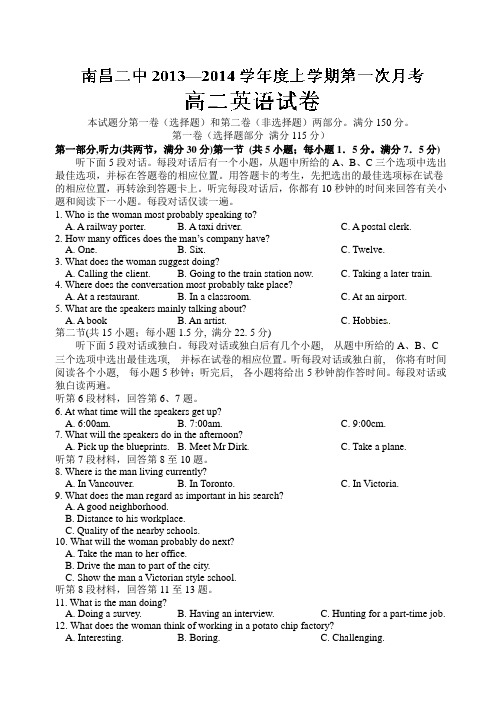
本试题分第一卷(选择题)和第二卷(非选择题)两部分。
满分150分。
第一卷(选择题部分满分115分)第一部分,听力(共两节,满分30分)第一节(共5小题;每小题1.5分。
满分7.5分) 听下面5段对话。
每段对话后有一个小题,从题中所给的A、B、C三个选项中选出最佳选项,并标在答题卷的相应位置。
用答题卡的考生,先把选出的最佳选项标在试卷的相应位置,再转涂到答题卡上。
听完每段对话后,你都有10秒钟的时间来回答有关小题和阅读下一小题。
每段对话仅读一遍。
1. Who is the woman most probably speaking to?A. A railway porter.B. A taxi driver.C. A postal clerk.2. How many offices does the man’s company have?A. One.B. Six.C. Twelve.3. What does the woman suggest doing?A. Calling the client.B. Going to the train station now.C. Taking a later train.4. Where does the conversation most probably take place?A. At a restaurant.B. In a classroom.C. At an airport.5. What are the speakers mainly talking about?A. A bookB. An artist.C. Hobbies.第二节(共15小题;每小题1.5分, 满分22. 5分)听下面5段对话或独白。
每段对话或独白后有几个小题, 从题中所给的A、B、C 三个选项中选出最佳选项, 并标在试卷的相应位置。
听每段对话或独白前, 你将有时间阅读各个小题, 每小题5秒钟;听完后, 各小题将给出5秒钟韵作答时间。
江西南昌市2012—2013学年度高三第一次模拟测试 英语
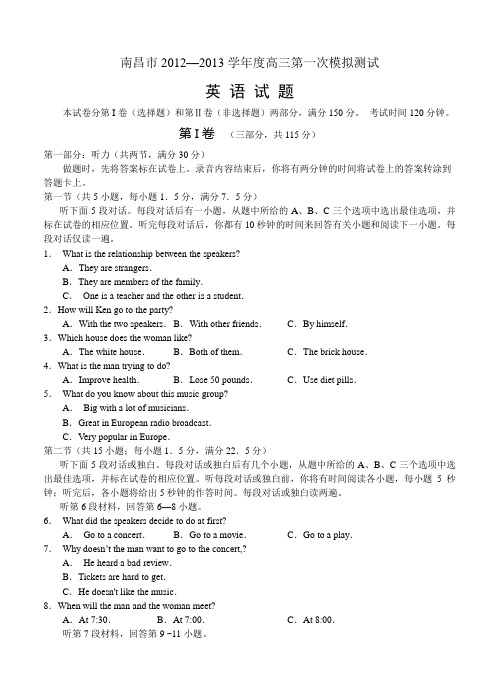
南昌市2012—2013学年度高三第一次模拟测试英语试题本试卷分第I卷(选择题)和第Ⅱ卷(非选择题)两部分,满分150分。
考试时间120分钟。
第I卷(三部分,共115分)第一部分:听力(共两节,满分30分)做题时,先将答案标在试卷上。
录音内容结束后,你将有两分钟的时间将试卷上的答案转涂到答题卡上。
第一节(共5小题,每小题1.5分,满分7.5分)听下面5段对话。
每段对话后有一小题,从题中所给的A、B、C三个选项中选出最佳选项,并标在试卷的相应位置。
听完每段对话后,你都有10秒钟的时间来回答有关小题和阅读下一小题。
每段对话仅读一遍。
1.What is the relationship between the speakers?A.They are strangers.B.They are members of the family.C.One is a teacher and the other is a student.2.How will Ken go to the party?A.With the two speakers.B.With other friends.C.By himself.3.Which house does the woman like?A.The white house.B.Both of them.C.The brick house.4.What is the man trying to do?A.Improve health.B.Lose 50 pounds.C.Use diet pills.5.What do you know about this music group?A.Big with a lot of musicians.B.Great in European radio broadcast.C.Very popular in Europe.第二节(共15小题;每小题1.5分,满分22.5分)听下面5段对话或独白。
江西省南昌三中2012-2013学年高二上学期开学考试英语试题-Word版含答案

江西省南昌三中2012-2013学年高二上学期开学考试英语试题-Word版含答案南昌三中2012—2013学年度上学期开学考试高二英语试卷本试卷分第Ⅰ卷(选择题)和第Ⅱ卷(非选择题)两部分。
共100分,考试时间为100分钟。
考试结束,将答卷和答题卡一并交回。
第Ⅰ卷(共80分)第一部分听力(共两节,满分20分)第一节(共5小题;每小1分,满分5分)听下面5段对话。
每段对话后有一个小题,从题中所给的A、B、C三个选项中选出最佳选项,并标在试卷的相应位置。
听完每段对话后,你都有10秒钟的时间来回答有关小题和阅读下一小题。
每段对话仅读一遍。
1. What are the speakers talking about?A. Drawing.B. Movie.C. Music.2. What is the woman doing?A. Buying a book.B. Returning a book.C. Borrowing a book.3. What can we know about Liu Zhu from the conversation?A. He looks like a girl.B. He likes the Super Girl.C. He is fond of dancing.4. What is the man usually downloaded?A. Films.B. Songs.C. Information.5. What can we infer about the man?A. He has moved to New York.B. He works for New York Times.C. He subscribes to New York Times.第二节(共15小题; 每小1分,满分15分)听下面5段对话或独白。
每段对话或独白后有几个小题,从题中所给的A、B、C 三个选项中选出最佳选项,并标在试卷的相应位置。
江西省南昌三中2013届高三第一次月考英语试题
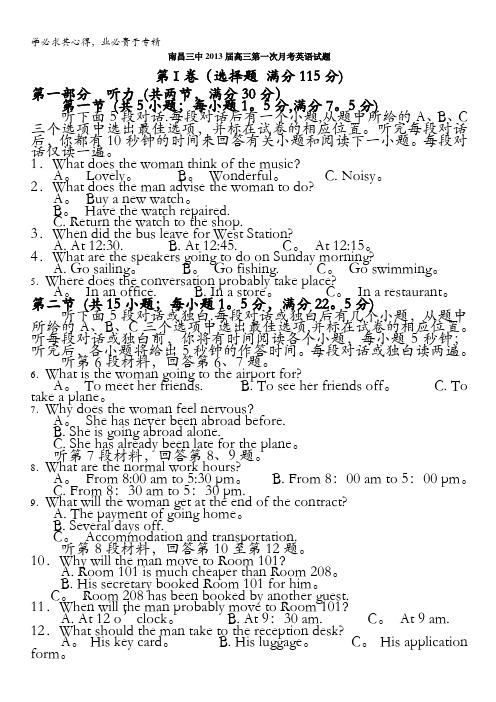
学必求其心得,业必贵于专精南昌三中2013届高三第一次月考英语试题第I卷(选择题满分115分)第一部分听力(共两节,满分30分)第一节(共5小题;每小题1。
5分,满分7。
5分)听下面5段对话.每段对话后有一个小题,从题中所给的A、B、C 三个选项中选出最佳选项,并标在试卷的相应位置。
听完每段对话后,你都有10秒钟的时间来回答有关小题和阅读下一小题。
每段对话仅读一遍。
1.What does the woman think of the music?A。
Lovely。
B。
Wonderful。
C. Noisy。
2.What does the man advise the woman to do?A。
Buy a new watch。
B。
Have the watch repaired.C. Return the watch to the shop.3.When did the bus leave for West Station?A. At 12:30.B. At 12:45. C。
At 12:15。
4.What are the speakers going to do on Sunday morning?A. Go sailing。
B。
Go fishing. C。
Go swimming。
5.W here does the conversation probably take place?A。
In an office. B. In a store。
C。
In a restaurant。
第二节(共15小题;每小题1。
5分,满分22。
5分)听下面5段对话或独白.每段对话或独白后有几个小题,从题中所给的A、B、C三个选项中选出最佳选项,并标在试卷的相应位置。
听每段对话或独白前,你将有时间阅读各个小题,每小题5秒钟;听完后,各小题将给出5秒钟的作答时间。
每段对话或独白读两遍。
听第6段材料,回答第6、7题。
6.W hat is the woman going to the airport for?A。
江西省四校2012-2013学年高二上学期第一次月考英语试题
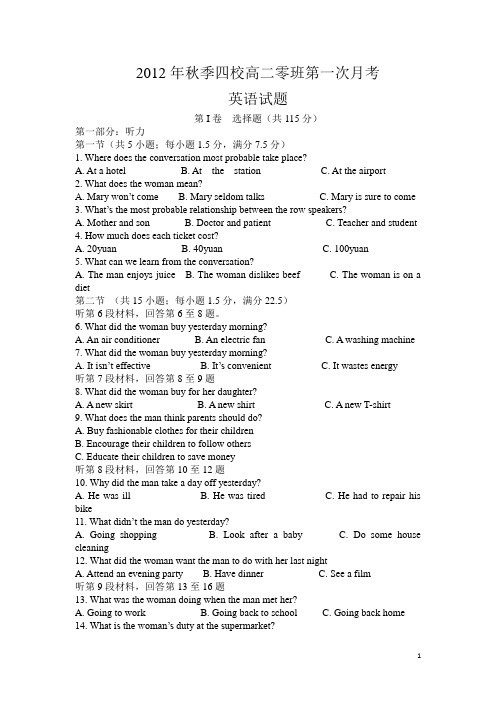
2012年秋季四校高二零班第一次月考英语试题第I卷选择题(共115分)第一部分:听力第一节(共5小题;每小题1.5分,满分7.5分)1. Where does the conversation most probable take place?A. At a hotelB. At the stationC. At the airport2. What does the woman mean?A. Mary won’t comeB. Mary seldom talksC. Mary is sure to come3. What’s the most probable relationship between the row speakers?A. Mother and sonB. Doctor and patientC. Teacher and student4. How much does each ticket cost?A. 20yuanB. 40yuanC. 100yuan5. What can we learn from the conversation?A. The man enjoys juiceB. The woman dislikes beefC. The woman is on a diet第二节(共15小题;每小题1.5分,满分22.5)听第6段材料,回答第6至8题。
6. What did the woman buy yesterday morning?A. An air conditionerB. An electric fanC. A washing machine7. What did the woman buy yesterday morning?A. It isn’t effectiveB. It’s conve nientC. It wastes energy听第7段材料,回答第8至9题8. What did the woman buy for her daughter?A. A new skirtB. A new shirtC. A new T-shirt9. What does the man think parents should do?A. Buy fashionable clothes for their childrenB. Encourage their children to follow othersC. Educate their children to save money听第8段材料,回答第10至12题10. Why did the man take a day off yesterday?A. He was illB. He was tiredC. He had to repair his bike11. What didn’t the ma n do yesterday?A. Going shoppingB. Look after a babyC. Do some house cleaning12. What did the woman want the man to do with her last nightA. Attend an evening partyB. Have dinnerC. See a film听第9段材料,回答第13至16题13. What was the woman doing when the man met her?A. Going to workB. Going back to schoolC. Going back home14. What is the woman’s duty at the supermarket?A. Cleaning the placeB. Weighing fruits and vegetablesC. Taking care of customers’ bab ies15. Where does the man work?A. In the gardenB. In the garageC. On the farm16. Why must the two speakers work?A. To get some pocket moneyB. To help support their familiesC. To earn money for their education听第10段材料,回答第17至20题17. Why is the Tokyo government excited at the IOC’s decision?A. Tokyo has beaten Madrid in the first stage of the selection processB. Tokyo has moved to the final stage of the selection processC. Tokyo has been selected as the host city of the 2020 Summer Olympic Games18. How many cities bid to host the 2020 Summer Olympic Games in the beginning?A. ThreeB. FourC. Five19. What’s Japan’s purpose of bidding to host the 2020 Summer Olympic Games?A. To make money from tourismB. To recover from disasterC. To raise its international reputation20. What should Tokyo do urgently?A. Raise public awarenessB. Win international supportC. Make a good financial budget第二部分:英语知识运用第一节:单项填空(共15小题;每小题1分,共15分)21. Some researchers are finding that daydreaming may be important to mental health .Daydreaming ,they say, is good means of relaxation.A. the; /B. /; theC. /; /D. /; a22. It’s reported that some wild animals were found in a big cave in the mountain.A. to hide deadB. hidden deadC. hiding deadD. hidden death23. What like to like on the soft beach enjoying the summer sun?A. do youB. does itC. are youD. is it24. ----You failed again in the maths exam yesterday.----Don’t tell Dad about it; if he knows that ,I’m dead.A.as well asB. as good asC. as possible asD. as faras25. You’d better write down the phone number of that restaurant for future .A. purposeB. referenceC. progressD. memory26. My friend, who on the International Olympic Committee all his life, is retiring next month.A. servedB. is servingC. had servedD. has served27. ----The 7:30 plane hasn’t turned up yet.----It has gone off its to keep away from the sudden stormA.journeyB. courseC. flightD.direction28. It was already lunchtime, so we sat down there was a nice nice and ate something.A. beforeB. unlessC. thatD. where29. ----Would you mind if I turned the TV on?---- .A.Yes, thanksB. No, you’d better notC. No, not in the leastD. Yes, goahead30. ----How long in hospital?----One more week at most. He is quickly recovering.A.does your father stayB. has your father stayedC. is your father stayingD. did your father stay31. Across North China in the world, namely the Great Wall.A. the longest wall runsB. runs the longest wallC. does run the longestD. does the longest wall run32. He was the last man I wanted to meet, but I managed to smile at him.A. thereforeB. howeverC. besidesD. somehow33. If you keep on working hard, you are sure to in your career.A. go awayB. get offC. go aheadD. get ahead34. , the sun was rising in the east.A. Arriving thereB. We arriving thereC. Having arrived thereD. We arrived35. The girl hid herself under the table she could see everything taking place in the room.A. after whichB. from whereC. from whichD. in where第二节:完形填空(共20小题;每小题1.5分,共30分)Mickey was a nice, cheerful, optimistic boy. No one could remember ever having seen him 36;it seemed he didn’t 37 whatever people said to him. Even his teachers admired his good 38. It was so unusual that a story was going aro und that Mickey’s 39 must be due to some special secret. They asked Mickey so much that, one afternoon, he 40 his favorite teacher, Mr. Anthony, to tea. When they had finished, Mickey 41 Mr. Anthony around the house. When Mickey opened his bedroom door, the teacher 42 . The huge wall was a unique collage (拼贴画) of thousands of colors and shapes! It was the loveliest 43 Mr. Anthony had ever seen.“Some people at school think I 44 think badly of anyone,” Mickey started to explain, “and that 45 at all bothers me, but that’s not true at all. I’m just like anyoneelse. I used to get angrier than all the other kids. 46 years ago, with the help of my parents, I started a small collage. With every little piece I stuck on I added some bad thought or act.”It was 47. The teacher looked closely at the wall. In each one of the small 48 he could read, “fool”, “silly”, “pain”, “bore”, and a thousand other 49 things.“This is how I started 50 all my bad times into an opportunity to 51 to my collage. Now I like the collage so much that, each time someone makes me angry, I cou ldn’t be 52 . They’ve given me a new piece for my work of 53 .”That day, the teacher was impressed by Mickey’s secret to having an optimistic character. Without telling anyone, on that very day, Mr. Anthony 54 his own collage. He would often 55 it to his students. Years later, each house contained its own beautiful works of art, made by those cheerful and optimistic children.36. A. angry B. lonely C. excited D. calm37. A. understand B. accept C. forget D. mind38. A. character B. decision C. method D. dream39. A. cleverness B. goodness C. anxiety D. worry40. A. introduced B. helped C. invited D. followed41. A. promised B. drove C. moved D. showed42. A. relaxed B. appeared C. froze D. escaped43. A. photo B. decoration C. door D. color44. A. never B. often C. ever D. almost45. A. something B. nothing C. everything D. anything46. A. As B. But C. Because D. Though47. A. reasonable B. crazy C. true D. difficult48. A. books B. walls C. boxes D. pieces49. A. negative B. strange C. clever D. small50. A. turning B. throwing C. cutting D. packing51. A. belong B. get C. add D. lead52. A. quicker B. happier C. more careful D. more friendly53. A. literature B. movie C. science D. art54. A. left B. began C. missed D. bought55. A. limit B. lend C. send D. recommend第三部分:阅读理解(共20小题,每小题2分,满分40分)AGroup buying is one of the fastest growing trends in South Africa today. Industry leaders are confident the growth potential remains strong since group buying is location-specific. Start-up costs are low and profit room remains high, so many sites continue to receive invested money despite widespread criticism and Facebook’s decision to phase out of deal business due to privacy concerns.In the early stages of all industries, some companied fail because they cannot compete with stronger companies in difficult economic conditions. To deal with difficult conditions, an alarming number of businesses are developing group buying websites in places like China and India, so the increase of group buying in South Africa is nothing more than a natural progression into the international mainstream.The group buying concept is fairly new and consumers have accepted this concept because they can now make full use of the rich information available on the Internet. Group buying is convenient and easy so it works. Anyone can view a site, join a mailing list, subscribe to RSS or print out a coupon(优惠券). The current group buying structure offered by the industry leaders works although there are still challenges to overcome.Perhaps, the future of group buying is tied to the joining together of social media and mobile devices. Mobile devices are with us wherever we go and almost everyone is using some type of social media site like Facebook or Twitter to stay informed. Using GPS and social media technology to provide real time location-specific promotions would be beneficial to every consumer looking for the best deals in town.Pause for a moment and think about it! What is better than signing on to your phone while having fun in town and you receive a real time information that your favorite shop across the street is offering a killer dial?The future of the group buying in South Africa is bright and we can expect to see more advanced approaches to this concept in the future. In addition to the technological advances consumers will see the range of promotions expand to include new products and services.56. What does the underlined phrase “phase out of” mean in the passage?A. Gradually stopB. Gradually increaseC. Begin to developD. Continue to enlarge57. The author sets China and India as examples to show that .A. China and India are powerful countriesB. China and India are in difficult economic conditionsC. group buying is successful worldwideD. group buying is an international trend58. Which of the following is true according to the passage?A. People have accepted group buying because it’s a new conceptB. Social media and mobile devices have been joinedC. GPS and social media technology will be helpful in group buyingD. Shops usually offer a killer deal when their customers are having fun59. The author’s attitude towards the future of group buying is .A. pessimisticB. optimisticC. objectiveD. subjective60. What does the passage mainly tell us?A. The history of group buyingB. Group buying in South AfricaC. The feature of group buyingD. The group buying conceptBKelly Reeves was getting ready for a trip when her phone slipped into a sink full of water. Panic moment! She quickly picked up the wet phone and tried to turn it on, but nothing worked. Her first reaction? She got dressed, drove to the nearest store, and bought a new mobile at full price.A new study finds that fear of losing your phone is a common illness. About 66 percent of those surveyed suffer from nomophobia or “no mobile phone phobia”.Interestingly, more women worry about losing their phone than men.Fort unately, there’s a solution.The first step is to figure out if you have nomophobia. Checking your phone too often is one thing, but the true sign of a problem is that you can’t conduct business or go about your routine when the fear becomes so severe.Do you go to unusual lengths to make sure you have your phone? That’s another sign of a problem. If you find you check your phone plenty of times per hour, or a total of an hour per day, there may be a problem.Some of the treatments are similar to those for treating anxiety attacks: leaving the phone behind and not checking e-mail or text messages, and then learning to tolerate the after anxiety. Even if this leads to a high level of worry and stress, the solution is to push through the fear and learn to deal with not having your phone.Of course, there are also technological alternatives. Luis Levy, a co-founder at Novy PR, says he uses an application called Cerberus that can automatically track the location of his phone. To find it, he can just go to a websi te and see the phone’s location.He also insures his phone through a service called Asurion. The company’s description of its product reads like a prescription for anxiety:”60 million phones are lost, stolen or damaged each year. You’ll have complete peace of mind knowing that your phone is protected and you can quickly reconnect with family, friends and work, as soon as the very next day!”61. Why does the author mention Kelly’s experience in the first paragraph?A. To introduce the topic for discussion.B. To inform us that mobile phones are useful.C. To warn us that we should be careful.D. To tell us we should get phones ready for a trip.62. The underlined word “nomophobia” in Paragraph 2 means “ ” .A. habits of using mobile phonesB. fear of losing mobile phonesC. eagerness for new mobile phonesD. independence of mobile phones63. Which of the following is a way to treat nomophobia?A. Avoiding using a phone for some timeB. Learning more about modern technologyC. Protectin g one’s phone against any damageD. Not using a mobile phone in one’s daily work64. Why can the service called Asurion help to treat nomophobia?A. It lets you know other people also lose their phones.B. It will give you a new phone through insurance.C. It enables you to reconnect with your acquaintances.D. It gives you a prescription to treat nomophobia65. What is the passage mainly about?A. Attitude toward mobile phonesB. New mobile phone technologyC. Disadvantages of mobile phonesD. Solutions to nomophobiaCMoving to a new town or even a new neighborhood is stressful at any age, but a new study shows that frequent moves in childhood are related to poorer well-being(幸福) in adulthood, especially among people who are more introverted(内向的) or neurotic(神经症的).The researchers tested the relationship between the number of childhood moves and well-being in a sample of 7108 American adults who were followed for 10 years.“We know that children who move frequently are more likely to perform poorly in school and have mor e behavioral problems,” said the study’s lead author Shigehiro Oishi. “However, the long-term effects of moving on well-being in adulthood have been overlooked by researchers.”The study’s participants, who were between the ages of 20 and 75, were contacted in 1994 and 1995 and were surveyed again 10 years later. They were asked how many times they had moved as children, as well as about their psychological well-being, personality type and social relationships.The researchers found that the more times people moved as children, the more likely they were to report lower life satisfaction and psychological well-being at the time they were surveyed. The research also showed that those who moved frequently as children had fewer quality social relationships as adults.The researchers also looked to see if different personality types affected frequent movers’ well-being. Among introverts, the more moves participants reported as children, the worse off they were as adults. “Moving a lot makes it difficult for people to keep long-term close relationships.” Said Oishi. “This might not be a serious problem for outgoing people who can make friends quickly and easily.”The findings showed neurotic people who moved frequently reported less life satisfaction and poorer psychological well-being than people who did not move as much and people who were not neurotic. However, the number and quality of neurotic people’s relationships had no effect on their well-being, no matter how often they had moved as children. In the article, Oishi thinks this may be because neurotic people have more negative reactions to stressful life events in general.“We can guess that moving often creates more stress,” Oishi said. “But we need more research on this link before we can conclude that moving often in childhood can, in fact, be dangerous to your health in the long-term.”66. What can be learnt about the new study from the passage?A. The participants were from all over the world.B. It was carried out in two periods of time.C. The participants were mostly old people.D. The participants had poor health.67. What is the purpose of the study?A. To show the relationship between moving and performance in schoolB. To show the relationship between moving and well-beingC. To investigate Americans’ well-being in generalD. To research the personality types of Americans68. According to Oishi, .A. moving a lot is a serious problem for outgoing peopleB. moving probably makes some people feel worried and tenseC. moving frequently is likely to help people make more friendsD. moving often is dangerous to people’s health in the long-term69. The fifth and sixth paragraphs mainly talk about .A. the process of the studyB. the results of the studyC. the importance of the studyD. the theory of the study70. It can be inferred from the passage that .A. adults should take more care over their kidsB. neurotic people are likely to move frequentlyC. children who move frequently behave well in schoolD. personality types are related to frequent movers’ happinessDPeter Rabbit is a character in various children’s stories written by Beatrix Potter(1866-1943). Peter Rabbit made his first appearance in 1902 in The Tale of Peter Rabbit. Peter doesn’t obey his mother’s orders and goes away. Mr.McGregor spots him and runs after him. Peter manages to escape, but not before losing his jacket and shoes, which Mr.McGregor uses to dress a scarecrow(稻草人). Peter returns home tired and ill.In the Tale of Benjamin Bunny, first publishe d in 1904, Peter’s cousin Benjamin Bunny brings him back to Mr.McGregor’s garden and they get back the clothes Peter lost in The Tale of Peter Rabbit. But after they gather onions to give to Peter’s mother, they are caught by Mr.McGregor’s cat. Benjamin’s father arrives and rescues them, but also blames Peter and Benjamin for going into the garden. In this tale, Peter displays fear about returning to the garden.In the The Tale of the Flopsy Bunnies, first published in 1909, Peter has a small role and appears only briefly. He is grown up and his sister Flopsy is now married to Benjamin Bunny. The two are the parents of six little Flopsy-Bunnies. Peter and his mother keep a nursery garden and the bunnies come by asking him for spare cabbage.In the Tale of Mr. Tod, first published in 1912, Benjamin and Flopsy’s children are taken away by Tommy Brock. Peter helps Benjamin run after Brock, who hides out in the house of the fox Mr. Tod. Mr. Tod finds Brock sleeping in his bed and as the two get into a fight, Peter rescues the children.Peter makes cameo appearances(客串出场) in two other tales. In The Tale of Mrs. Tiggy-Winkle, first published in 1905, Peter and Benjamin are customers of Mrs. Tiggy-Winkle, a hedgehog(刺猬) washerwoman. In The Tale of Ginger and Pickles, first published in 1909, Peter and other characters from Potter’s previous stories make cameo appearances.71. In The Tale of Peter Rabbit, Peter .A. is caught by Mr. McGregor’s catB. gathers onions to give to his motherC. runs into a scarecro w when escapingD. loses his clothes in Mr. McGregor’s garden72. In paragraph 4, the underlined part “the two” refers to .A. Benjamin and BrockB. Peter and BenjaminC. Mr. Tod and BrockD. Peter and Mr. Tod73. What do we know about Benjamin Bunny?A. He’s a father of six childrenB. He keeps a nursery garden with PeterC. His mother passes away when he’s littleD. He saves Peter in The Tale of the Flopsy Bunnies74. According to the passage, Peter Rabbit .A. hates Benjamin Bunn y’s father a lotB. appears briefly in The Tale of Mrs. Tiggy-WinkleC. was worked into a story in the early 19th centuryD. plays a leading role in The Tale of the Flopsy Bunnies75. The author wrote the passage to .A. introduce the character Peter Rabbit in Potter’s storiesB. describe the various characters in Potter’s booksC. show the influence of the Peter Rabbit series on childrenD. discuss Potter’s changes in her writing styles第II卷(共35分)第四部分:写作(共两节,满分35分)第一节:阅读表达(共5小题;每小题2分,满分10分)阅读下面短文,并根据短文后的要求答题(请注意问题后的字数要求)。
江西省南昌二中2012-2013学年高二上学期期中考试英语试题
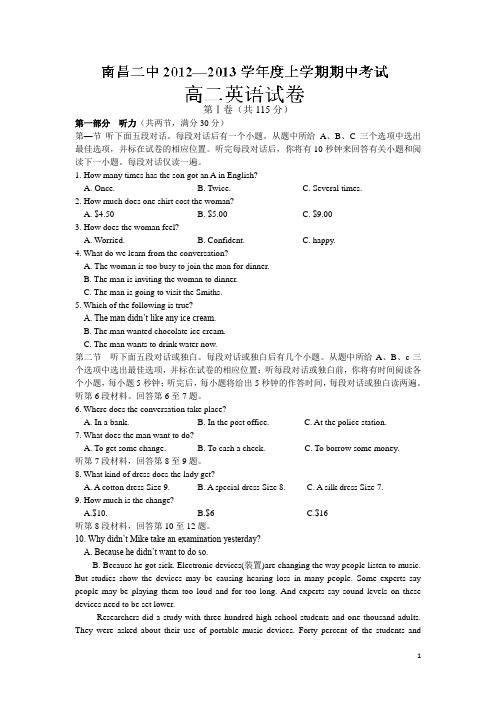
第Ⅰ卷(共115分)第一部分听力(共两节,满分30分)第—节听下面五段对话。
每段对话后有一个小题。
从题中所给A、B、C三个选项中选出最佳选项,并标在试卷的相应位置。
听完每段对话后,你将有10秒钟来回答有关小题和阅读下一小题。
每段对话仅读一遍。
1. How many times has the son got an A in English?A. Once.B. Twice.C. Several times.2. How much does one shirt cost the woman?A. $4.50B. $5.00C. $9.003. How does the woman feel?A. Worried.B. Confident.C. happy.4. What do we learn from the conversation?A. The woman is too busy to join the man for dinner.B. The man is inviting the woman to dinner.C. The man is going to visit the Smiths.5. Which of the following is true?A. The man didn’t like any ice cream.B. The man wanted chocolate ice cream.C. The man wants to drink water now.第二节听下面五段对话或独白。
每段对话或独白后有几个小题。
从题中所给A、B、c三个选项中选出最佳选项,并标在试卷的相应位置:听每段对话或独白前,你将有时间阅读各个小题,每小题5秒钟;听完后,每小题将给出5秒钟的作答时间,每段对话或独白读两遍。
听第6段材料。
回答第6至7题。
6. Where does the conversation take place?A. In a bank.B. In the post office.C. At the police station.7. What does the man want to do?A. To get some change.B. To cash a check.C. To borrow some money.听第7段材料,回答第8至9题。
江西省南昌市第三中学高二英语上学期第一次月考试题
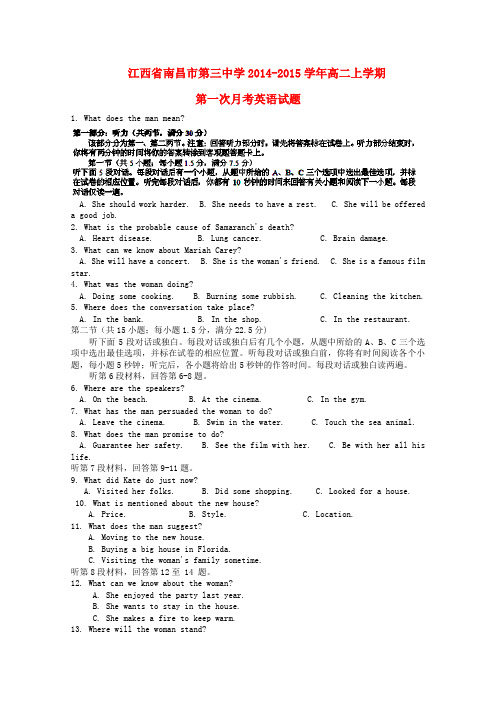
江西省南昌市第三中学2014-2015学年高二上学期第一次月考英语试题1. What does the man mean?A. She should work harder.B. She needs to have a rest.C. She will be offereda good job.2. What is the probable cause of Samaranch's death?A. Heart disease.B. Lung cancer.C. Brain damage.3. What can we know about Mariah Carey?A. She will have a concert.B. She is the woman's friend.C. She is a famous film star.4. What was the woman doing?A. Doing some cooking.B. Burning some rubbish.C. Cleaning the kitchen.5. Where does the conversation take place?A. In the bank.B. In the shop.C. In the restaurant.第二节(共15小题;每小题1.5分,满分22.5分)听下面5段对话或独白。
每段对话或独白后有几个小题,从题中所给的A、B、C三个选项中选出最佳选项,并标在试卷的相应位置。
听每段对话或独白前,你将有时间阅读各个小题,每小题5秒钟;听完后,各小题将给出5秒钟的作答时间。
每段对话或独白读两遍。
听第6段材料,回答第6-8题。
6. Where are the speakers?A. On the beach.B. At the cinema.C. In the gym.7. What has the man persuaded the woman to do?A. Leave the cinema.B. Swim in the water.C. Touch the sea animal.8. What does the man promise to do?A. Guarantee her safety.B. See the film with her.C. Be with her all his life.听第7段材料,回答第9-11题。
江西省南昌市第三中学高二英语上学期第一次月考试卷
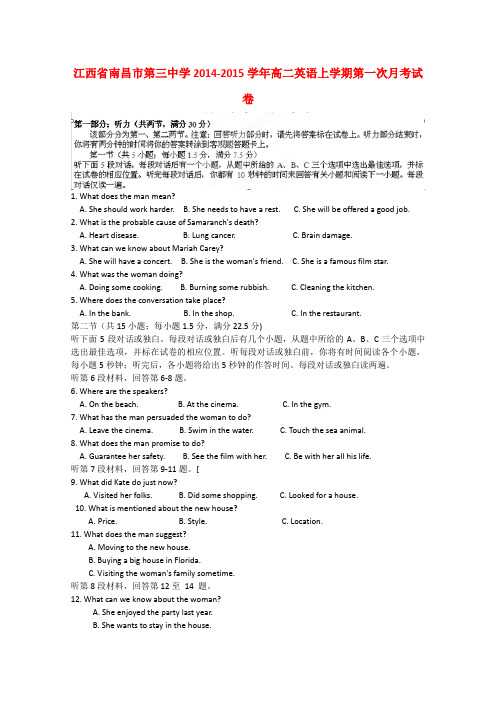
江西省南昌市第三中学2014-2015学年高二英语上学期第一次月考试卷1. What does the man mean?A. She should work harder.B. She needs to have a rest.C. She will be offered a good job.2. What is the probable cause of Samaranch's death?A. Heart disease.B. Lung cancer.C. Brain damage.3. What can we know about Mariah Carey?A. She will have a concert.B. She is the woman's friend.C. She is a famous film star.4. What was the woman doing?A. Doing some cooking.B. Burning some rubbish.C. Cleaning the kitchen.5. Where does the conversation take place?A. In the bank.B. In the shop.C. In the restaurant.第二节(共15小题;每小题1.5分,满分22.5分)听下面5段对话或独白。
每段对话或独白后有几个小题,从题中所给的A、B、C三个选项中选出最佳选项,并标在试卷的相应位置。
听每段对话或独白前,你将有时间阅读各个小题,每小题5秒钟;听完后,各小题将给出5秒钟的作答时间。
每段对话或独白读两遍。
听第6段材料,回答第6-8题。
6. Where are the speakers?A. On the beach.B. At the cinema.C. In the gym.7. What has the man persuaded the woman to do?A. Leave the cinema.B. Swim in the water.C. Touch the sea animal.8. What does the man promise to do?A. Guarantee her safety.B. See the film with her.C. Be with her all his life.听第7段材料,回答第9-11题。
江西南昌二中2013届高三上学期第一次考试英语试题

江西南昌二中2012—2013学年度上学期第一次考试高三英语试题命题人:万利群本试卷分第Ⅰ卷(选择题)和第Ⅱ卷(非选择题)。
满分为150分。
考试用时120分钟。
第Ⅰ卷(共115分)第一部分:听力第一节(共5小题;每小题1.5 分,满分7.5分)听下面5段对话。
每段对话后有一个小题,从题中所给的A、B、C三个选项中选出最佳选项,并标在试卷的相应位置。
听完每段对话后,你都有10秒钟的时间来回答有关小题和阅读下一小题。
每段对话仅读一遍。
1.What might prevent the woman buying the table?A.Its quality.B.The price.C.Its design.2.Who planted the trees?A. The woman.B. Henry.C. Someone else.3.What happened to the woman?A. She got fired today.B. She got promoted last week.C. She was fooled by the man.4.What did the man do?A. He gave the woman the wrong information.B. He put the sugar in the black container.C. He added salt to his coffee.5.How long is a day on Mars?A. Less than 24 hours.B.24 hours and 37 minutes.C.37 hours.第二节听下面5段对话或独白。
每段对话或独白后有几个小题,从题中所给的A、B、C三个选项中选出最佳选项,并标在试卷的相应位置。
听每段对话或独白前,你将有时间阅读各个小题,每小题5秒;听完后,各个小题将给出5秒钟的作答时间。
江西省南昌市第二中学2012-2013学年高二英语第一次月考试题新人教版
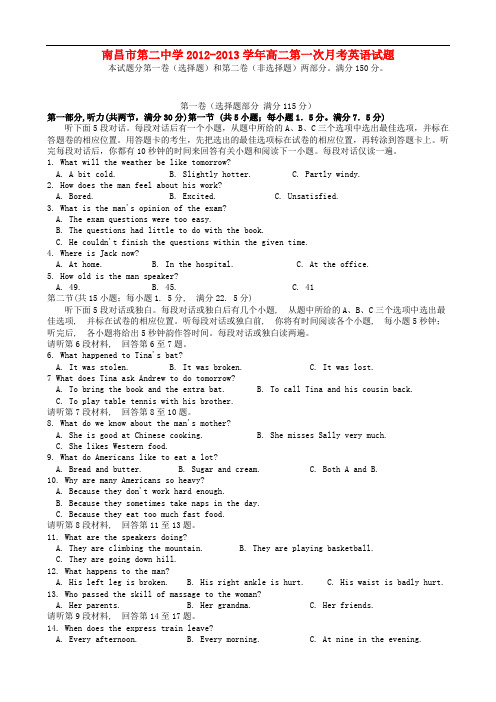
南昌市第二中学2012-2013学年高二第一次月考英语试题本试题分第一卷(选择题)和第二卷(非选择题)两部分。
满分150分。
第一卷(选择题部分满分115分)第一部分,听力(共两节,满分30分)第一节 (共5小题;每小题1.5分。
满分7.5分) 听下面5段对话。
每段对话后有一个小题,从题中所给的A、B、C三个选项中选出最佳选项,并标在答题卷的相应位置。
用答题卡的考生,先把选出的最佳选项标在试卷的相应位置,再转涂到答题卡上。
听完每段对话后,你都有10秒钟的时间来回答有关小题和阅读下一小题。
每段对话仅读一遍。
1. What will the weather be like tomorrow?A. A bit cold.B. Slightly hotter.C. Partly windy.2. How does the man feel about his work?A. Bored.B. Excited.C. Unsatisfied.3. What is the man's opinion of the exam?A. The exam questions were too easy.B. The questions had little to do with the book.C. He couldn't finish the questions within the given time.4. Where is Jack now?A. At home.B. In the hospital.C. At the office.5. How old is the man speaker?A. 49.B. 45.C. 41第二节(共15小题;每小题1. 5分, 满分22. 5分)听下面5段对话或独白。
每段对话或独白后有几个小题, 从题中所给的A、B、C三个选项中选出最佳选项, 并标在试卷的相应位置。
江西省南昌三中2012-2013学年高二上学期第一次月考英语试卷
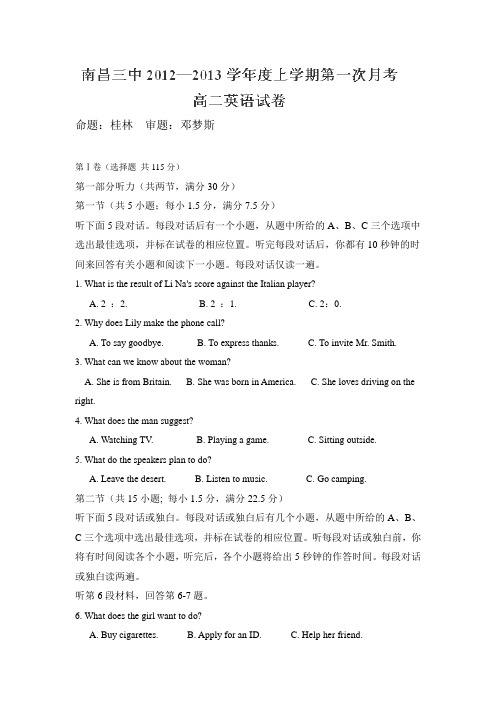
命题:桂林审题:邓梦斯第Ⅰ卷(选择题共115分)第一部分听力(共两节,满分30分)第一节(共5小题;每小1.5分,满分7.5分)听下面5段对话。
每段对话后有一个小题,从题中所给的A、B、C三个选项中选出最佳选项,并标在试卷的相应位置。
听完每段对话后,你都有10秒钟的时间来回答有关小题和阅读下一小题。
每段对话仅读一遍。
1. What is the result of Li Na's score against the Italian player?A. 2 :2.B. 2 :1.C. 2:0.2. Why does Lily make the phone call?A. To say goodbye.B. To express thanks.C. To invite Mr. Smith.3. What can we know about the woman?A. She is from Britain.B. She was born in America.C. She loves driving on the right.4. What does the man suggest?A. Watching TV.B. Playing a game.C. Sitting outside.5. What do the speakers plan to do?A. Leave the desert.B. Listen to music.C. Go camping.第二节(共15小题; 每小1.5分,满分22.5分)听下面5段对话或独白。
每段对话或独白后有几个小题,从题中所给的A、B、C三个选项中选出最佳选项,并标在试卷的相应位置。
听每段对话或独白前,你将有时间阅读各个小题,听完后,各个小题将给出5秒钟的作答时间。
每段对话或独白读两遍。
听第6段材料,回答第6-7题。
6. What does the girl want to do?A. Buy cigarettes.B. Apply for an ID.C. Help her friend.12. Why does the woman decide to make sandwiches?A. They like eating sandwiches.B. Sandwiches are easy to carry.C. There are only sandwiches left.13. What will the woman give Vikram?A. An apple and sandwiches.B. Sandwiches and a vegetable dish.C. A cup of coffee and sandwiches.听第9段材料,回答第14-16题。
【英语】江西省南昌三中2012-2013学年高二上学期期末考试
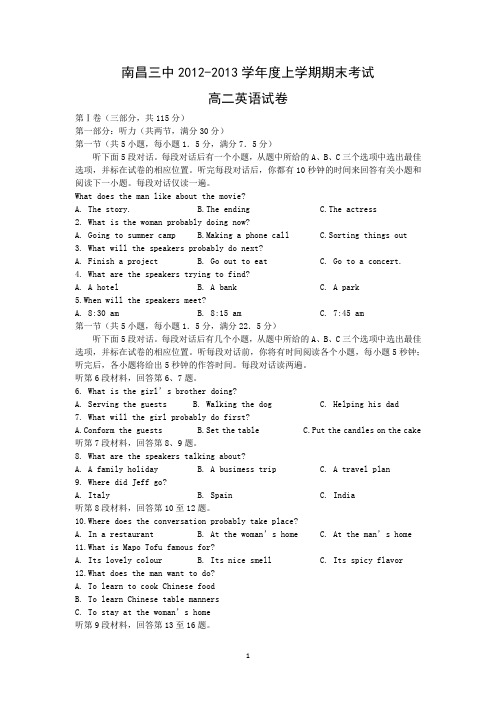
南昌三中2012-2013学年度上学期期末考试高二英语试卷第Ⅰ卷(三部分,共115分)第一部分:听力(共两节,满分30分)第一节(共5小题,每小题1.5分,满分7.5分)听下面5段对话。
每段对话后有一个小题,从题中所给的A、B、C三个选项中选出最佳选项,并标在试卷的相应位置。
听完每段对话后,你都有10秒钟的时间来回答有关小题和阅读下一小题。
每段对话仅读一遍。
What does the man like about the movie?A. The story.B.The endingC.The actress2. What is the woman probably doing now?A. Going to summer campB.Making a phone callC.Sorting things out3. What will the speakers probably do next?A. Finish a projectB. Go out to eatC. Go to a concert.4. What are the speakers trying to find?A. A hotelB. A bankC. A park5.When will the speakers meet?A. 8:30 amB. 8:15 amC. 7:45 am第一节(共5小题,每小题1.5分,满分22.5分)听下面5段对话。
每段对话后有几个小题,从题中所给的A、B、C三个选项中选出最佳选项,并标在试卷的相应位置。
听每段对话前,你将有时间阅读各个小题,每小题5秒钟;听完后,各小题将给出5秒钟的作答时间。
每段对话读两遍。
听第6段材料,回答第6、7题。
6. What is the girl’s brother doing?A. Serving the guestsB. Walking the dogC. Helping his dad7. What will the girl probably do first?A.Conform the guestsB.Set the tableC.Put the candles on the cake 听第7段材料,回答第8、9题。
江西省南昌三中2013-2014学年高二英语上学期第一次月考试题(含解析)新人教版

江西省南昌三中2013-2014学年高二英语上学期第一次月考试题〔含解析〕新人教版第一局部:听力〔共两节,总分为30分〕该局部分为第一、第二两节。
注意:回答听力局部时,请先将答案标在试卷上。
听力局部完毕时,你将有两分钟的时间将你的答案转涂到客观题答题卡上。
第一节〔共5小题;每一小题1.5分,总分为7.5分〕听下面5段对话。
每段对话后有一个小题,从题中所给的A、B、C三个选项中选出最优选项,并标在试卷的相应位置。
听完每段对话后,你都有10秒钟的时间来回答有关小题和阅读下一小题。
每段对话仅读一遍。
例:How much is the shirt?A. £19.15B. £9.18C. £9.15答案是C。
1. What does the man want to do?A. Take photos.B. Buy a camera.C. Help the woman.2. What are the speakers talking about?A. A noisy nightB. Their life in town.C. A place of living.3. Where is the man now?A. On his way.B. In a restaurant.C. At home.4. What will Celia do?A. Find a player.B. Watch a game.C. Play basketball.5. What day is it when the conversation takes place?A. Saturday.B. Sunday.C. Monday.第二节〔共15小题;每一小题1.5分,总分为22.5分〕听下面5段对话或独白。
每段对话或独白后有几个小题,从题中所给的A、B、C三个选项中选出最优选项,并标在试卷的相应位置。
听每段对话或独白前,你将有时间阅读各个小题,每一小题5秒钟;听完后,各小题将给出5秒钟的作答时间。
高二英语月考试题及答案-南昌三中-学年高二上学期第一次月考24
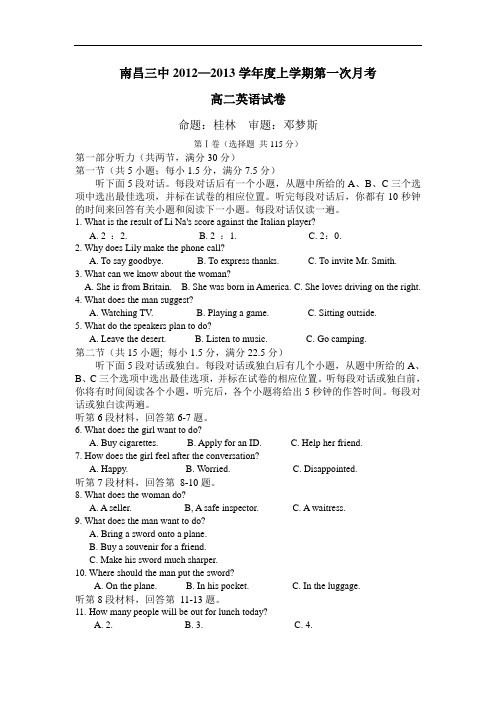
南昌三中2012—2013学年度上学期第一次月考高二英语试卷命题:桂林审题:邓梦斯第Ⅰ卷(选择题共115分)第一部分听力(共两节,满分30分)第一节(共5小题;每小1.5分,满分7.5分)听下面5段对话。
每段对话后有一个小题,从题中所给的A、B、C三个选项中选出最佳选项,并标在试卷的相应位置。
听完每段对话后,你都有10秒钟的时间来回答有关小题和阅读下一小题。
每段对话仅读一遍。
1. What is the result of Li Na's score against the Italian player?A. 2 :2.B. 2 :1.C. 2:0.2. Why does Lily make the phone call?A. To say goodbye.B. To express thanks.C. To invite Mr. Smith.3. What can we know about the woman?A. She is from Britain.B. She was born in America.C. She loves driving on the right.4. What does the man suggest?A. Watching TV.B. Playing a game.C. Sitting outside.5. What do the speakers plan to do?A. Leave the desert.B. Listen to music.C. Go camping.第二节(共15小题; 每小1.5分,满分22.5分)听下面5段对话或独白。
每段对话或独白后有几个小题,从题中所给的A、B、C三个选项中选出最佳选项,并标在试卷的相应位置。
听每段对话或独白前,你将有时间阅读各个小题,听完后,各个小题将给出5秒钟的作答时间。
每段对话或独白读两遍。
听第6段材料,回答第6-7题。
- 1、下载文档前请自行甄别文档内容的完整性,平台不提供额外的编辑、内容补充、找答案等附加服务。
- 2、"仅部分预览"的文档,不可在线预览部分如存在完整性等问题,可反馈申请退款(可完整预览的文档不适用该条件!)。
- 3、如文档侵犯您的权益,请联系客服反馈,我们会尽快为您处理(人工客服工作时间:9:00-18:30)。
南昌三中2012—2013学年度上学期第一次月考高二英语试卷命题:桂林审题:邓梦斯第Ⅰ卷(选择题共115分)第一部分听力(共两节,满分30分)第一节(共5小题;每小1.5分,满分7.5分)听下面5段对话。
每段对话后有一个小题,从题中所给的A、B、C三个选项中选出最佳选项,并标在试卷的相应位置。
听完每段对话后,你都有10秒钟的时间来回答有关小题和阅读下一小题。
每段对话仅读一遍。
1. What is the result of Li Na's score against the Italian player?A. 2 :2.B. 2 :1.C. 2:0.2. Why does Lily make the phone call?A. To say goodbye.B. To express thanks.C. To invite Mr. Smith.3. What can we know about the woman?A. She is from Britain.B. She was born in America.C. She loves driving on the right.4. What does the man suggest?A. Watching TV.B. Playing a game.C. Sitting outside.5. What do the speakers plan to do?A. Leave the desert.B. Listen to music.C. Go camping.第二节(共15小题; 每小1.5分,满分22.5分)听下面5段对话或独白。
每段对话或独白后有几个小题,从题中所给的A、B、C三个选项中选出最佳选项,并标在试卷的相应位置。
听每段对话或独白前,你将有时间阅读各个小题,听完后,各个小题将给出5秒钟的作答时间。
每段对话或独白读两遍。
听第6段材料,回答第6-7题。
6. What does the girl want to do?A. Buy cigarettes.B. Apply for an ID.C. Help her friend.7. How does the girl feel after the conversation?A. Happy.B. Worried.C. Disappointed.听第7段材料,回答第8-10题。
8. What does the woman do?A. A seller. B, A safe inspector. C. A waitress.9. What does the man want to do?A. Bring a sword onto a plane.B. Buy a souvenir for a friend.C. Make his sword much sharper.10. Where should the man put the sword?A. On the plane.B. In his pocket.C. In the luggage.听第8段材料,回答第11-13题。
11. How many people will be out for lunch today?A. 2.B. 3.C. 4.12. Why does the woman decide to make sandwiches?A. They like eating sandwiches.B. Sandwiches are easy to carry.C. There are only sandwiches left.13. What will the woman give Vikram?A. An apple and sandwiches.B. Sandwiches and a vegetable dish.C. A cup of coffee and sandwiches.听第9段材料,回答第14-16题。
14. Where does the conversation take place?A. In the bank.B. In the shop.C. In the post office.15. How will the man go home?A. By bus.B. On foot.C. By car.16. What can we infer from the conversation?A. The man will be charged $ 2 or $ 3.B. The man has got an ATM card.C. The man paid $ 10 for the service.听第10段材料,回答第17-20题。
17. What is the speaker mainly talking about?A. What to do during a flood.B. How to get help from others.C. How to drive in flooded areas.18. Who can benefit most from the speech?A. People who own expensive cars.B. People who are in flooded areas.C. People who have no radio or TV.19. What should be done before leaving the home?A. Lock the front door.B. Cut off the electricity.C. Leave the furniture outdoors.20. What does the speaker suggest?A. Driving the car to a higher place.B. Waiting for instructions to move.C. Avoiding walking in moving water.第二部分英语知识运用(共两节,满分45分)第一节单项填空(共15小题;每小题1分,满分15分)从A、B、C、D四个选项中,选出可以填入空白处的最佳选项。
21._______the rain falling so hard, it becomes more and more difficult to carry on the rescue work.A. SinceB. WithC. AsD. For22.It is reported that two schools, _______are being built in my hometown, will open next year.A. they bothB. which bothC. both of themD. both of which23. As is reported, a big fire broke out and out of _______ control, _______southwest of the city of Sichuan.A. the, theB. /, theC. the, /D. /, /24.Canada is a country _______many different nationalities as well as one with foreign immigrants _______the majority of its population.A. making up of, occupied withB. consisting of, making upC. made up of, consisting ofD. consisted of, taking up25.---Each of the students, who will take part in the math contest, _______these exercises.--- So have I.A. has doneB. have doneC. didD. will do26. As a matter of fact, no one moved in the bushes. It was only your_______.A. imaginationB. recognitionC. acceptanceD. observation27.The Titanic was a ship just not ________to run into icebergs. When it did, nothing could stop its journey to the bottom.A. designB. to designC. designedD. designing28.He could have helped us, but he _______from coming in time by a traffic jam.A. has been preventedB. had been preventedC. is preventedD. was prevented29. Nobody knows exactly how long it will be ______the Chinese build a space station.A. beforeB. forC. whenD. until30. It is none of your business _______other people think about you. Believe yourself.A. howB. whatC. whichD. when31. The two men were _______receiving stolen property, which made their parents worried.A. suspected toB. suspected ofC. suspected onD. suspected for32. After lunch, my parents went to work in the field one after_______.A. oneB. otherC. each otherD. the other33. Why _______you trouble me when I’m busy with my lessons?A. canB. mayC. mustD. would 34. Mum is coming. What present _______for your holiday?A. you expect she has gotB. you expect has she gotC. do you expect she has gotD. do you expect has she got35. The Internet gives people the chance to have the information they need _______to them quickly and cheaply.A. deliveredB. deliveringC. to deliverD. deliver第二节完形填空(共20小题;每小题1.5分,满分30分)阅读下面短文,从短文后各题所给的四个选项(A、B、C和D)中,选出最佳选项。
